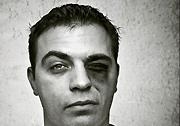Eye warning as occy straps lash out
Easter-period travellers are being warned to take care with octopus straps that hospitalise 540 people each year with severe eye injuries.
Easter-period travellers are being warned to take care with octopus straps that hospitalise 540 people each year with severe eye injuries.

Easter-period travellers are being warned to take care with octopus straps that hospitalise 540 people each year with severe eye injuries.
Nearly 50 percent of these injuries occur during leisure activities around holiday periods. Most occur as people are securing loads to vehicle roof racks, strapping loads across trailers and keeping luggage closed, according UNSW eye expert, Stephen Dain.
"Octopus strap-related eye injuries can result in the hook penetrating the eye, causing bleeding and an array of injuries such as glaucoma, retinal detachment, cataract and, in some cases, the complete loss of the eye. In addition, the impact may cause damage to the retina and optic nerve," Professor Dain says.
"Eye injuries such as these are best avoided by not using the extendible straps to tie down loads. It would be better to use ropes and a truckie's hitch knot or flat straps with adjusting buckles.
"If octopus straps must be used, don't overstretch them and don't tighten them by pulling straight towards yourself - stand well to one side. Occupational eye protectors will also provide some protection."
Testing at UNSW's Optics and Radiometry Laboratory reveals that the octopus strap's hook is small enough to hit the eyeball directly and can rebound at speeds of up to 270 kph. Nearly 90 percent of octopus strap eye injuries occur among men, with most aged less than 30 years old.
UNSW is working with the Optometrists Association of Australia (OAA) to assess the impact of a recoiling octopus strap on a naked eye, an eye covered by normal glasses and eyes covered by safety glasses. The OAA's Executive Director, Andrew McKinnon says the warning issued by the OAA and UNSW is timely with the forthcoming Easter break.
For Sydney man, Albert Matson, the warning comes too late. The 50-year-old truck driver lost 40 percent of the vision in his left eye after being struck by an octopus strap that snapped while he was securing a tarpaulin on his truck. A supervisor at his workplace, Albert has barred other truck drivers from using octopus straps to tie down their loads.
Media contacts: Professor Stephen Dain, 0414 385 622 or Dan Gaffney, 0411 156 015